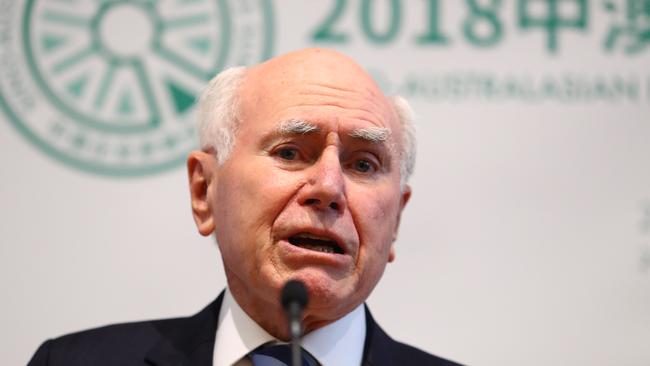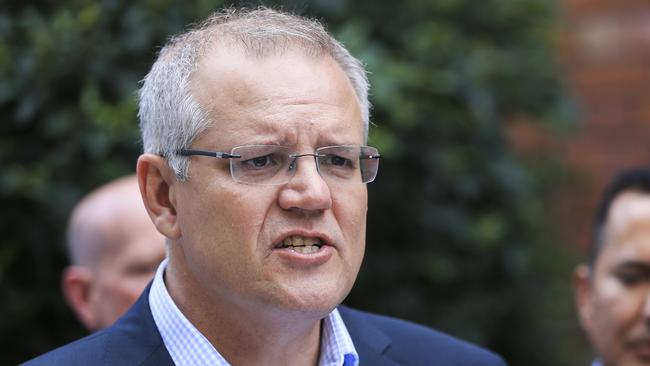John Howard wrote blueprint for winning elections
THE former PM has been talking about effective, family-friendly and voter-pleasing policy for years. You’d think his party would listen to its most successful modern leader, writes Miranda Devine.
Rendezview
Don't miss out on the headlines from Rendezview. Followed categories will be added to My News.
YOU’D think, with all its troubles over the past five years, the Liberal Party might listen to the time-tested advice of its most successful modern leader.
The best way for the Liberal party to win elections, writes John Howard in the introduction to new edition of Howard: The Art of Persuasion, is to emphasise the “the central role of the family”.
It’s what he’s always said.
“Intact and fully functional families constitute the least costly social welfare system yet devised by mankind,” Howard wrote in his bestseller, The Menzies Era.
“There is no institution that provides more emotional support and reassurance to the individual than the family,” he wrote in a 1988 policy document, “Future Directions”, whose package of family values, home ownership and “one united nation” became the blueprint for the Howard government eight years later.
“There is no institution which is a more efficient deliverer of social welfare than a united, affectionate, functioning family. It’s the best social welfare policy that mankind has ever devised.”
Making the family a central priority was the key to Howard’s success. He insisted every policy be judged on whether it strengthened the family unit, “the great building block of our society”.

His government had “a responsibility to ensure that the family unit has the legal, financial and social support necessary to sustain it. This will require action on two levels — reversal of modern anti-family attitudes and positive incentives to reinforce the family.”
As PM he promised a “bias in our taxation system towards families with dependent children”.
His ambition was “to profoundly advantage the families of Middle Australia. It has meant more to me than anything else and it remains at the core of my political being”.
And that is what he delivered, with generous family tax benefits, Family Relationship Centres to counsel couples in difficulty, a baby bonus and assistance for single income families with dependent children.
He was the most family-friendly prime minister in Australian history.
His version of income-splitting was Family Tax Benefits Part A and Part B, giving families the choice of having one parent stay at home when children were young, if they so desired, as many do. His reward was four terms in government.
But over the past decade, his policies came to be derided as anachronistic “middle-class welfare”, even by his own side.
The 2014 Abbott budget tried to cut the Family Tax Benefits but was blocked in the Senate.
The Turnbull government, with Scott Morrison as Treasurer, tried again and managed a freeze last year, saving $2.4 billion.

Howard was exercised enough about this dismantling of his legacy that he made a rare policy critique after the 2014 budget, telling the ABC: “Family Tax Benefits are not welfare payments; they’re tax breaks for couples who have children … I think there should be tax breaks for the cost of raising children.”
But his successors bought the feminist gospel and lost their way with ill-fated paid parental leave schemes and expensive subsidised child care, denying families choice and impelling parents to outsource child-rearing to strangers.
This rejection of Howard’s unifying narrative is an inexplicable failure by a party which has embedded in its constitution the concept of “family life … as fundamental to the wellbeing of society”.
The federal platform adopted in 2002 states: “the interests of families should be at the centre of national policy making.”
Corporate tax cuts, jobs and infrastructure are important, but they leave people cold. Spending money to strengthen families is an investment in social infrastructure. Why is it better to build a road than to buttress the building blocks of society?
Far from being anachronistic, Howard was ahead of his time.
Take Hungary, where Viktor Orban has defied the conventional wisdom in Europe that mass migration is necessary to counteract declining fertility rates.

Hungary spends almost five per cent of its Gross Domestic Product (GDP) on family support, twice as much as the OECD average, encouraging couples to have large families, to foster a child-friendly society and ease cost of living pressures for families. A staggeringly generous Family Housing Allowance Program offers $50,000 to married couples who commit to having three children and buy their own home.
There are generous tax deductions for families with children which start when the foetus is 91 days old, tax allowances that encourage young couples to marry, free holiday camps for children, lowered utility costs and a “pro-family culture” written into the Hungarian constitution.
After eight years, the results are in, and they are spectacular.
There’s been a baby boom in Hungary, women are more likely to get married than elsewhere in Europe and marry younger. By last year the number of marriages had risen by 42 per cent, divorces were down 25 per cent and abortion numbers had plunged by more than a third. Orban was re-elected for a third straight term this year.
Of course, feminists, sociologists and Euro-crats hate him.
That’s because strengthening families, giving them a stake in society, helping them rear good citizens and own a home, results in an electorate more likely to vote conservative.
Hungary’s measures are probably too drastic for Australia, but the Liberal Party already has a sure-fire formula for success from Howard and a blueprint embedded in its DNA which would be kryptonite against a Labor Party captured by identity politics.
Originally published as John Howard wrote blueprint for winning elections


